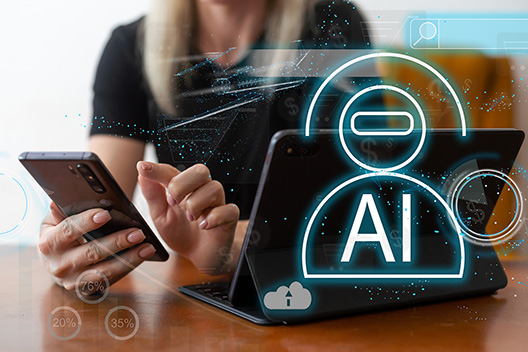The discussion around AI (artificial intelligence) is both exciting and a bit scary. Although AI has existed since the 1950s, recent advances has been in the news a lot lately, causing a media frenzy and plenty of conspiracy theories. You may well ask, “What is all of the fuss about?”
The growing buzz is mostly about “generative AI,” a type of artificial intelligence that can generate or produce content like images, audio, video and text. The chatbots and AI assistants are trained to be problem solvers and creators, using large language models to generate output that previously required human intelligence. For some, that makes it scary. For others, like me, that makes it exciting.
When I talk about AI with others, particularly those who are wary of its implications, I often explain that they are using it already without realizing it. Consider those annoyingly helpful predictive texts when composing or replying to a message, or popular voice assistants like Apple’s Siri or Amazon’s Alexa. Don’t forget the facial recognition features on our devices, online shopping prompts, GPS systems and even Netflix recommendations. These systems work so well because they are “listening,” so to speak. They pay attention to our patterns and try to predict our needs and preferences.


For instance, as I got in my car the other day to pick up lunch, my watch alerted me that it would take 13 minutes to reach my physical therapist’s office. I paused for a moment before realizing what was happening. The technology had noticed my pattern of leaving around the same time on a particular day of the week to go to that destination. If I’m completely honest, I’m a bit annoyed by the assumptions while also enjoying the assistance.
I’m excited about how generative AI could really benefit us in the short and long term. I think these advancements will let us reclaim time from mundane tasks and free us to focus on other innovative, creative and specialized skills. Of course, we cannot and should not rely totally on AI, and we should be ethical in its application — checking its output for accuracy and completeness.
HOW MIGHT AI IMPACT CAREGIVING?
I hope that as AI advances, it will help me in caring for my parents, who have dementia, by gathering data about their routines and habits and predicting their needs, safety risks and potential for developing certain ailments. Artificial intelligence models and assistants may even be able to suggest the measures I should take to address or correct issues that arise.
HERE ARE SOME OTHER WAYS I SEE AI BEING USEFUL FOR CAREGIVERS:
Instead of making my best guess about my parents’ care, AI assistants may be able to guide me to a better plan of action. Should I call the doctor? Do I need to take them to the emergency room? Are they dehydrated? Might they need a medication adjustment? Eventually, an AI-powered device may provide answers to these questions and more.
Although many devices are available now that monitor vital signs for various conditions, I predict that AI not only will vastly improve these devices, but make them capable of much more than alerting the patient or caregiver to potential concerns. Such devices could be enabled to communicate directly with a patient’s nurse or doctor to offer a treatment suggestion instead of the patient having to wait weeks or months for an appointment.
I also look forward to using AI to not only help with meal planning, including grocery delivery or pickup, based on my calendar availability, and suggestions of what to prepare.
The possibilities for the future of AI really are endless. Are you excited, wary — or a little of both?




2 Comments
Leave a Reply